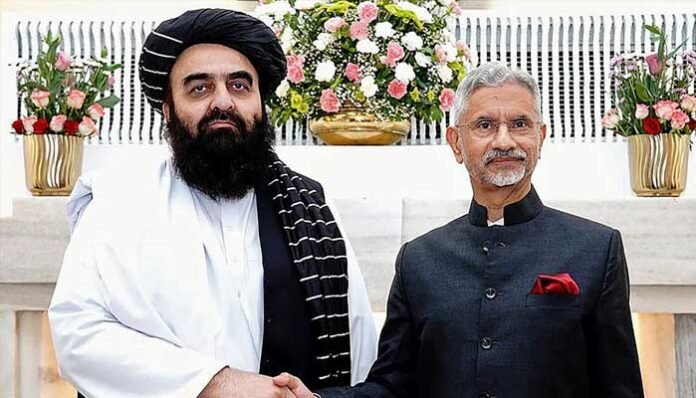India, which has not given any diplomatic recognition to the Taliban-led government, threw a red-carpet welcome to Afghanistan’s acting Foreign Minister Amir Khan Muttaqi when he arrived in New Delhi on October 9, signalling clearly that the world’s 4th largest economic power is well prepared to play a meaningful role in the South Asian region. It was evident when India announced upgrading its Technical Mission in Kabul to the status of an Embassy.
However, even as this development was unfolding in New Delhi, Pakistan, in a desperate move to reassert its control over the Taliban regime, launched airstrikes on Kabul and eastern Afghanistan. Timing of airstrikes showed that Pakistan wanted the Taliban regime in Afghanistan to distance itself from India.
The Taliban, instead chose to do the opposite as Muttaqi, during his first ever bilateral meeting with External Affairs Minister Dr S Jaishankar, called India a “close friend” while stating that his visit would lead to improvement in relations between the two countries.
Rift between Pakistan and Afghanistan
For Pakistan, there seems to be no option but to admit that it has lost the Taliban even though the group was nurtured, sheltered, and given all kinds of support when western power-backed regime ruled over Afghanistan for 20 years. Pakistan is now accusing the Taliban administration of funding and arming the Pakistan Taliban, known as Tehreek-e-Taliban Pakistan (TTP), which Islamabad blames for surge in attacks on its armed forces.
Though the Afghan Taliban denies its role in providing support to the Pakistan Taliban, the former’s distrust with Islamabad seems to be far from over. Kabul has accused Islamabad of recklessly backing ISIS operatives against Afghanistan and its own Baloch nationals.
This growing rift between Pakistan and the Taliban government in Afghanistan has worked well with India which wants lasting peace and stability in the region. New Delhi’s outreach with the Taliban-led administration speaks volumes of this ground reality.
The first diplomatic contact between India and the Taliban began in November 2024, when senior official of the Ministry of External Affairs and current Indian envoy to Israel, J P Singh held multiple meetings with Taliban representatives, including acting Taliban Defence Minister Mullah Mohammad Yaqoob in Kabul.
For Pakistan, there seems to be no option but to admit that it has lost the Taliban even though the group was nurtured, sheltered, and given all kinds of support when western power-backed regime ruled over Afghanistan for 20 years. Pakistan is now accusing the Taliban administration of funding and arming the Pakistan Taliban, known as Tehreek-e-Taliban Pakistan (TTP), which Islamabad blames for surge in attacks on its armed forces
However, the strongest signals of New Delhi’s engagement came when Foreign Secretary Vikram Misri met Taliban’s acting Foreign Minister Muttaqi in Dubai in January 2025.
This year EAM Jaishankar spoke with Afghanistan’s acting Foreign Minister twice—first, on May 15 after 26 people which included 25 Indians and one Nepali national were killed in Pahalgam in the Union Territory of Jammu and Kashmir by Pakistan-based terrorists on April 22; second, following the devastative earthquake which hit Afghanistan in August.
Cross-border terrorism
In the wake of the attack in Pahalgam in Jammu and Kashmir by terrorists belonging to The Resistance Force (TRF), an offshoot of the Lashkar-e-Taiba on April 22, Afghanistan had strongly condemned the incident. Yet, what rattled Pakistan the most was the mention of Jammu and Kashmir in the India-Afghanistan joint statement where both countries “unequivocally condemned all acts of terrorism emanating from regional countries.”
“External Affairs Minister expressed his deep appreciation to Afghanistan for its strong condemnation of the terrorist attack in Pahalgam, Jammu and Kashmir, India on April 22 2025 as well as for the sincere condolences and solidarity expressed with the people and Government of India,” read the India-Afghanistan joint statement issued after Dr Jaishankar’s meeting with Afghanistan’s acting Foreign Minister Muttaqi in New Delhi on October 10.
Pakistan’s Foreign Ministry expressed its “strong reservations” regarding the mention of Jammu and Kashmir as part of India. “It was conveyed that the reference to Jammu and Kashmir as part of India is in clear violation of the relevant UN Security Council resolutions and the legal status of Jammu and Kashmir,” the Pakistan Foreign Ministry said in a statement, hinting clearly that Islamabad is deep in frustration over growing engagement between New Delhi and Kabul.
The growing rift between Pakistan and the Taliban government in Afghanistan has worked well with India which wants lasting peace and stability in the region. New Delhi’s outreach with the Taliban-led administration speaks volumes of this ground reality
To deter Afghanistan, Pakistan often resorts to airstrikes on Kabul while perpetuating cross-border terrorism through ISIS—signalling clearly that Islamabad, which last month decided to repatriate over 1.3 million Afghans to Afghanistan, will do everything possible to keep the Taliban unsettled.
However, such actions have only deepened mistrust between the two neighbours and pushed Afghanistan further away from Pakistan’s strategic orbit. A glimpse of this distrust between the two countries can also be seen in the statement of Taliban Spokesperson Zabeehullah Mujahid who warned Pakistan of leaving no “attack unanswered” and accused it of letting ISIS terrorists hide on their soil.
“Pakistan has turned a blind eye to the presence of ISIS on its soil. Afghanistan has the right to defend its air and land borders and will not leave any attack unanswered. Pakistan should expel the important ISIS members who are hiding on its soil or hand them over to the Islamic Emirate. The ISIS group poses a threat to many countries in the world, including Afghanistan,” Zabeehullah Mujahid said on October 12.
India supports Afghanistan’s stability
India supports a peaceful, secure, and stable Afghanistan, recognising that such stability is essential not only for the regional peace but also for global security. Situated at the crossroads of South and Central Asia, Afghanistan’s instability has the potential to fuel terrorism, extremism, and drug trafficking across the region.
Against this backdrop, there is an urgent need for a comprehensive strategy to combat terrorism and those who sponsor it. However, such an approach cannot succeed without the international community extending meaningful assistance to the Taliban, who are struggling with limited resources to contain various terrorist groups operating within Afghanistan.
India has repeatedly voiced its concerns that entities and individuals designated by the United Nations as terrorists could exploit Afghan territory to pursue their destabilising activities. This concern was reiterated during the 7th Moscow Format Consultations on Afghanistan, held in Moscow on October 8.
The first diplomatic contact between India and the Taliban began in November 2024, when senior official of the Ministry of External Affairs and current Indian envoy to Israel, J P Singh held multiple meetings with Taliban representatives, including acting Taliban Defence Minister Mullah Mohammad Yaqoob in Kabul. However, the strongest signals of New Delhi’s engagement came when Foreign Secretary Vikram Misri met Taliban’s acting Foreign Minister Muttaqi in Dubai in January 2025
Broadly, India’s position remains that a peaceful Afghanistan benefits not only its immediate neighbours but the wider international community as well. The country’s instability has historically provided safe havens for terrorist groups—a reality starkly evident during the Taliban’s first rule from 1996 to 2001.
Nevertheless, Afghanistan’s acting Foreign Minister, Amir Khan Muttaqi, assured that the Taliban would not allow Afghan soil to be used against any other country. Significantly, he also called for deeper Indian cooperation in the field of counter-terrorism.
India’s assistance to Afghanistan
India has invested over $3 billion in more than 500 projects across Afghanistan. It has built roads, dams, and hospitals, and has also developed infrastructure related to power. It has built a new parliament building. As a well-wisher of the Afghan people, it is ready to extend further support for the development and progress of the country. This commitment was there when EAM Dr Jaishankar told Muttaqi that “India has a deep interest in your (Afghanistan) in your development and progress.”
India has expressed its willingness to undertake maintenance and repairs of completed projects, as well as to resume and finish those that remained incomplete following the change of regime in Kabul. During Muttaqi’s visit, India announced six new development projects for Afghanistan, and as part of its continuing goodwill gesture, pledged to give 20 ambulances, MRI, CT scan machines, along with essential medicines to Afghan hospitals.
India supports a peaceful, secure, and stable Afghanistan, recognising that such stability is essential not only for the regional peace but also for global security. Situated at the crossroads of South and Central Asia, Afghanistan’s instability has the potential to fuel terrorism, extremism, and drug trafficking across the region
Additionally, India has agreed to help construct homes and provide material aid to those Afghan refugees who have been forcibly repatriated by Pakistan. “The plight of forcibly repatriated Afghan refugees is a matter of deep concern. Their dignity and livelihood are important. India agrees to help construct residences for them and continue providing material aid to rebuild their lives,” Jaishankar said during his meeting with the visiting acting Foreign Minister of Afghanistan. India has also agreed to collaborate with Afghanistan for the sustainable management of water resources in keeping with a history of cooperating on water management.
Overall, India’s engagement with the Taliban-led administration underscores New Delhi’s pragmatic approach to regional diplomacy, which is driven by stability, security, and strategic foresight rather than ideology. By extending developmental assistance, upgrading its mission in Kabul, and deepening dialogue on counter-terrorism, India has positioned itself as a responsible stakeholder in Afghanistan’s reconstruction and future.
In contrast, Pakistan’s coercive tactics, ranging from airstrikes to forced repatriation of refugees, reflect a growing sense of strategic insecurity as its traditional leverage over the Taliban erodes. The widening rift between Islamabad and Kabul has, inadvertently, created space for India to reclaim diplomatic influence in a region long shaped by rivalry and mistrust.
–The writer is a senior journalist with wide experience in covering international affairs. The views expressed are of the writer and do not necessarily reflect the views of Raksha Anirveda






